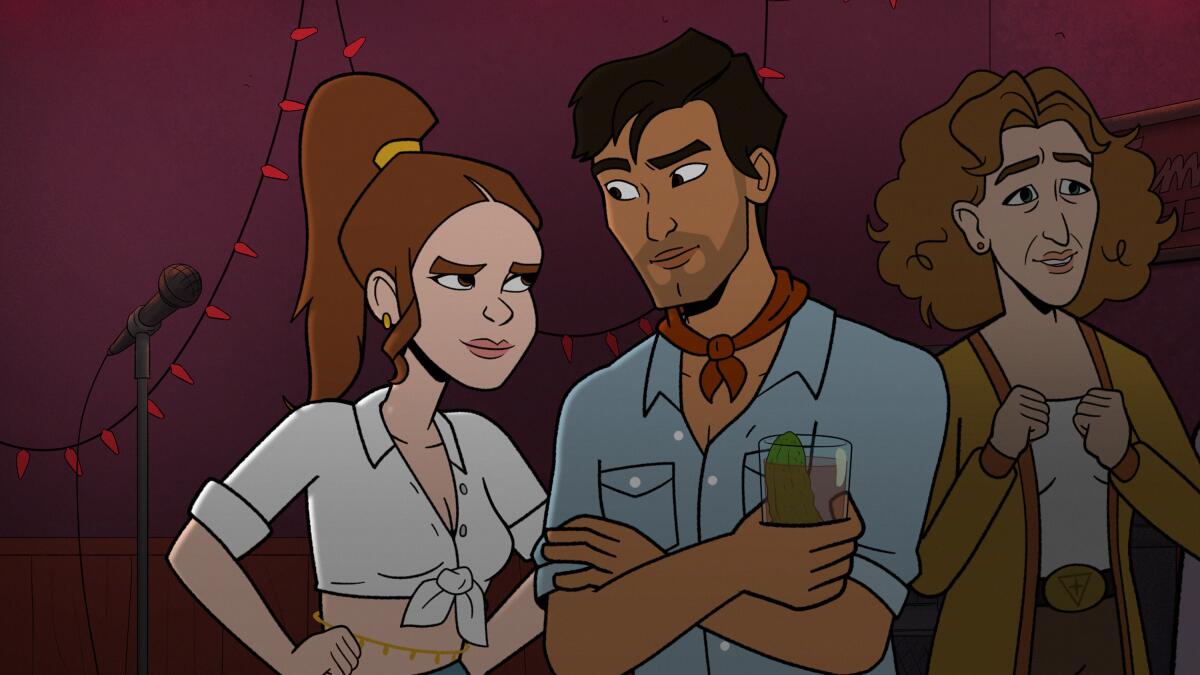‘Praise Petey’ review: Annie Murphy is back in another odd little town

- Share via
I haven’t heard anyone talk about this, but when AI does take over Hollywood (which everyone does talk about), it might well start with cartoons.
Robot voices are already working onscreen, imitating dead people for documentaries. (And who’s going to stop a producer from cloning Mel Blanc or June Foray or Daws Butler — not Mel or June or Daws, at any rate.) As to the animation, well, computers already do a lot of the heavy lifting in that department, and generations of viewers raised on TV cartoons are accustomed to characters who often barely merit the term “animated.” Once they feed a century of animated stories into the matrix, it’ll be a small step to getting rid of us completely.
So enjoy this moment, while the people are still in charge. It’s unlikely that a machine, no matter how deep its learning, would cook up “Praise Petey,” a generally amusing, vaguely satirical show about a girl who inherits a cult. Created by “SNL” head writer Anna Drezen (who also worked on the “Dark Ages” season of “Miracle Workers”), it premieres Friday on Freeform. Although television animation is currently in flux, with shows being canceled or whole platforms getting out of the business, “adult animation” remains a going concern — and is something of a novel move for the network, though its theme — young woman growing in a complicated world — is right in its wheelhouse.
Petey, played by Annie Murphy, who it is always a pleasure to see, or in this case, hear again, is a New York “It” girl, a sweet but practically helpless person who has a job as a “senior assistant editorial assistant at the biggest fashion magazine in Midtown,” a rich mother (Christine Baranski), who hates her when she recognizes her, and is engaged to Brian, literally a block of wood — unpack that metaphor as you may — who/which is regarded in the context of the show as a catch. (They break up when Petey discovers a splinter in her best friend’s lip.)
The sudden loss of her job, her apartment, her fiancé and her best friend brings on an existential crisis, at which point Petey’s mother, aware of her for a moment, produces a “VHS tape I’ve been hiding from you.” In it, the father she never knew she had (Stephen Root) introduces her to the town and cult he has founded and which, having apparently passed on, he has left in her keeping.

With nothing to keep her in Manhattan, Petey boards a bus to New Utopia, N.C., at which point culturally educated minds will turn quickly to “Schitt’s Creek,” the show that made Murphy a star; this impression will only strengthen when the first person she encounters, Bandit (John Cho), is a tall, dark, beardy hunk on the line of “Schitt’s Creek’s” Mutt. Their cute meet finds her in a mud puddle, after an encounter with a goat. (“I’m walking here,” says Petey, New Yorker that she is.) The two don’t get along at all — and so begins the series’ rom-com subplot.
Read The Times’ full coverage of “Schitt’s Creek,” nominated for best comedy series at the 2020 Emmys.
It has been a year since Petey’s father died, and after meeting Bandit — who grew up in the cult, left and has come back to dismantle it — Petey makes her way to town. She finds the population restless and rudderless and on the edge of ruin awaiting the prophesied return of the Great Daughter. There are the familiar cultish features — multiple wives for the leader, an apocalyptic cosmology that has the elected riding a comet to “space paradise,” which echoes the famous Heaven’s Gate cult.
It’s a theme of the series that Petey was a self-deprecating mouse who has spent eight years as an assistant assistant, and nearly overnight becomes the person to whom everyone looks for answers, whose will is their command — albeit her stated goal is to “de-weirdy” New Utopia and “[uncult] the cult from the inside.” She is guided away from this by Mae Mae (Amy Hill), her father’s true-believing old right hand, who has been running the show, if apparently not very well, and needs Petey’s presence in order to fulfill a random prophecy.
Something of an ally, on the other hand, is Eliza (Kiersey Clemons), the anomalously normal town bartender (the bar’s name is, by Times standards, an unprintable joke), with whom she bonds over their shared love of a TV show called “Hot People Over-Sharing Their Trauma and Then Kissing”; like Petey and Bandit. Eliza, who does not seem to belong there at all, is also hot — hotter than Petey’s former best friend, for even in cartoons, physiognomy is destiny.
The art is pleasant but generic. For the purposes of the show, Petey and Bandit need to be conventionally good-looking to support the romantic tension and, in the bargain, give the teens and young adults that constitute the Freeform demographic something pretty to look at. (A cameo appearance by “working actor Alan Tudyk,” played by Alan Tudyk — who does seem to be everywhere — gives Petey the occasion to wonder, “I don’t even know who the ‘Euphoria’ generation’s Alan Tudyk is … Is it Evan Peters?” “Evan Peters is 36,” she’s told. Old people!)
The Freeform audience is also liable to have watched a lot of cult documentaries and docudramas in their relatively short lives because, you know, there are a lot of them out there. But a comedy about cults, as opposed to a cult comedy, is a rarer thing. Indeed, apart from “Praise Petey,” and perhaps “The Unbreakable Kimmy Schmidt,” I couldn’t think of or find a single one, perhaps because, although their beliefs and practices can seem silly, their real-world effects often are not. Those Heaven’s Gate people all killed themselves, presumably to get to space paradise. It isn’t an isolated incident.
Which makes “Praise Petey” a little edgy, or creepy, but also a trifle unbalanced, given the job of making New Utopia somewhat appealing — “acceptable” might be the better word — to the viewer and finding something charming in its members’ deluded self-abasement. But if the cultists are essentially harmless, they are also crippled — when Petey tries to set them free, as with the “human shih tzu” who only wants to lie on her feet, or the three men who form a writing desk, they panic. This is framed as an error on her part, and in the way of culture-clash, fish-out-of-water stories, Petey will have as much to learn as to teach.
More to Read
The complete guide to home viewing
Get Screen Gab for everything about the TV shows and streaming movies everyone’s talking about.
You may occasionally receive promotional content from the Los Angeles Times.







